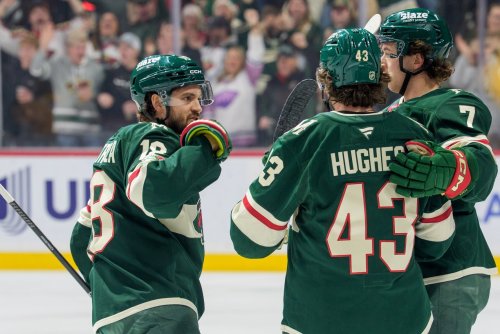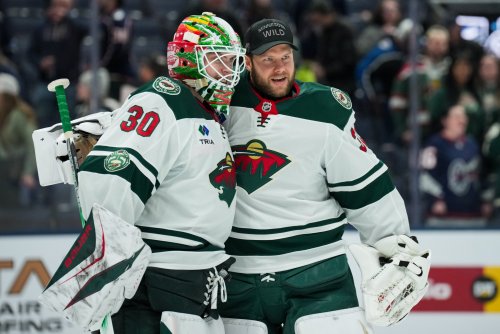
When I asked hockey Twitter to tell me what they found so amazing about Slap Shot decades after its release, I got some interesting answers. A lot of people quoted the movie's more memorable scenes, mainly the first one where goalie Denis Lemieux (played by Yvon Barrette) outlines the finer points of hockey:
Heck, I even got an answer from the official Hanson Brothers' Twitter:
Paul Newman is a legitimate prick in this movie.
I'm not kidding. As Reggie Dunlop, the aging player-coach of the ailing Charlestown Chiefs, this is Newman at his most vintage hockey player-esque. Dunlop isn't great at his job (as the fans can attest to in a rather funny scene where Dunlop and leading scorer Ned Braden, played by Michael Ontkean, are on a radio show taking calls), but he's skilled at bending the world to his will -- or so he thinks. When it turns out the Charlestown mill is closing, taking 10,000 jobs with it, he becomes worried about the team's future, and for good reason -- the manager, Joe McGrath (Strother Martin) tells him the team will fold at season's end.
This is where the plot device comes in -- in the form of three rambunctious, four-eyed brothers, the Hansons (played by Jeff and Steve Carlson and Jeff Hanson). While the other players on the team get drunk and look for groupies, the Hansons' idea of a wild Friday night is playing with toy race cars in their room. Dunlop is reluctant at first, but when he finally lets the boys take a shift, he realizes their violent style of play gets the fans excited... and that might just keep the team from going under. Not everyone buys into it -- particularly the team's star player, Ned Braden, who prefers a cleaner game and gets benched for it -- but all Dunlop sees is a way for the Chiefs to remain relevant.
So he jumps on the bandwagon. Granted, I don't think it was much of a push for him -- he was already so skeevy that I'm sure crossing the line into full douchebag wasn't that far. He resorts to low blows, taunts and teasing to get guys off their game, provoking fight after fight, and nothing is off limits. Not even an opposing player's wife and her same-sex experiences.
Yep, he's a jerk. And I think that's why it works.
As a matter of fact, I think that's why the entire movie works. It's for the same reason why one of my favorite scenes in another hockey movie, Miracle, is the one in Norway, right before the end of the game, where you hear the actors playing Phil Verchota, Bah Harrington and Buzzy Schneider talking about the girls in the stands. So many movies try to portray athletes as these do-no-wrong role models in completely sanitized environments (and Miracle is no exception) that this portrayal of a guy who will win at all costs, even if it means selling out to the lowest common denominator, is actually refreshing. Even if that guy also happens to be a total dickhead who will call an opponent's wife a gay slur in order to get him mad.
Speaking of, oh my. Hello, casual sexism and homophobia. Everywhere you look -- there's a guy calling someone the "f" word, there's the ridiculous stereotype of the "Charlestown Chiefs Booster Club" comprised solely of attractive women all too willing to sleep with the players, there's Dunlop insulting the owner of his own team and attacking her son because he didn't like that she wasn't going to sell the team to a new owner like he wanted her to. Is it probably close to what 1970s hockey (and society, for that matter) was like? Probably, and I'd be shocked if it weren't -- after all, writer Nancy Dowd based the script on her brother Ned's experiences playing for the Johnstown Jets of the Eastern (and later North American) Hockey League. So for that, I can understand the era was much different -- but that doesn't make the language any less jarring.
That being said, the final scene during the championship game, where Braden strips on the ice for his wife Lily, is probably my favorite scene in the movie and the only one I find making a pointed commentary on our ideas of sex and violence.
Here Ned is, taking off his equipment while "The Stripper" plays in the background and his teammates are all punching the hell out of each other. There's blood all over the ice, guys are practically incoherent from too many blows to the head -- but this dude getting naked in the middle of the rink is "disgraceful" and "not the way to play hockey." Funny how people are still saying that 37 years later, isn't it?
Overall, as someone admittedly from the "new school" watching this movie for the first time, I can't lie -- it was entertaining. It's spirited, raunchy, everything you would hope for a hockey film to be (and for that, I can accept the less savory stuff -- not excuse it by any means, because one look at this film can explain a lot of stuff going on today, but take it as part of this era). The characters are memorable, from Dunlop to Lemieux to the slightly-off-her-rocker Lily (and of course, the Hansons). The only thing I wished for was a little more character from the brothers themselves, but as it stands, the film is a good one for any hockey fan (or anyone who just really likes the '70s). Watch it if you haven't yet, and watch it again if you have.
And to end, I'd like to include my second-favorite scene, because I just freakin' love Denis Lemieux. Good day.
Women's Hockey Roundup:
Think you could write a story like this? Hockey Wilderness wants you to develop your voice, find an audience, and we'll pay you to do it. Just fill out this form.








Recommended Comments
There are no comments to display.
Join the conversation
You can post now and register later. If you have an account, sign in now to post with your account.
Note: Your post will require moderator approval before it will be visible.